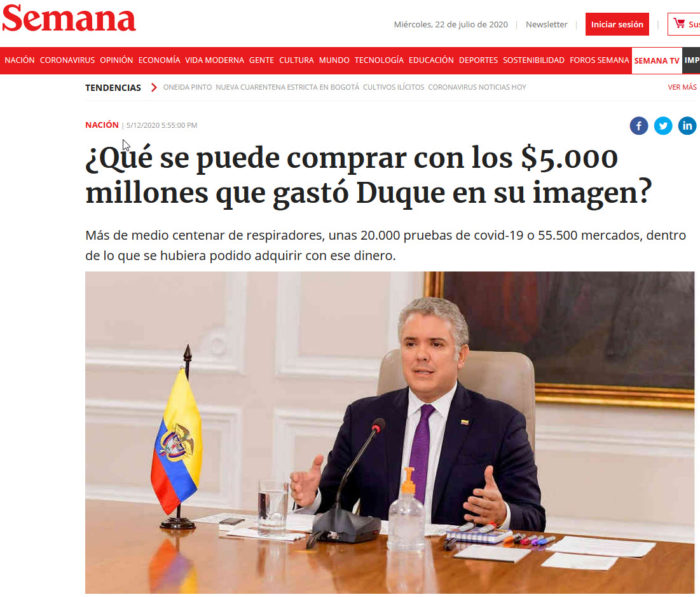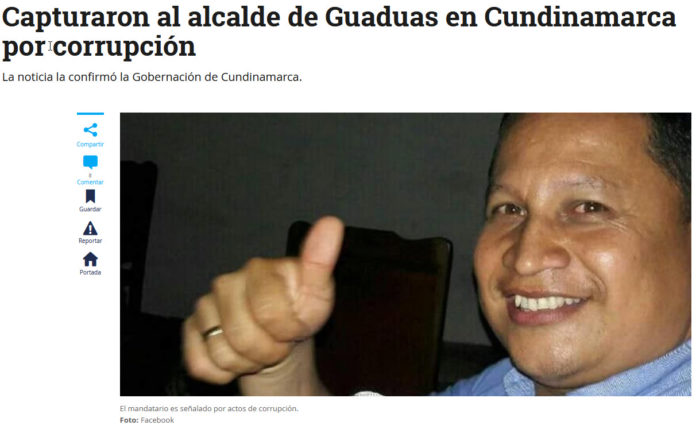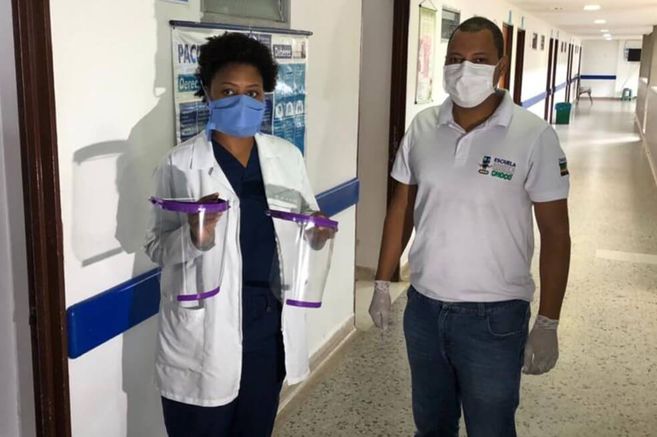8 July 2020. In Colombia, children from the Chocó Robotics Club located in one of the remotest, poorest, and most violence-scarred departments, have used their resources to create plastic masks for medical staff working in the underfunded hospitals that lack basic tools to confront the coronavirus. People are used to facing problems alone in this region as they cannot wait for the State that never comes. They are like the ‘Colonel who no one writes to’, with the difference that, rather than war, it is dying from disease that everyone is afraid of.
The warmth and generosity of the people can be seen on a daily basis in the Colombian capital Bogotá. Some restaurants, already hard hit by the loss of all of their normal business, are providing free meals to Venezuelan migrants who have had the last vestige of hope cruelly snatched away from them by the pandemic. On the streets, people throw money to the Mariachis who perform impromptu concerts, desperate to earn enough to feed their families.
The pandemic has revealed human kindness in a society all too often depicted in the dominant narrative of extreme violence. President Duque issued an address to the Colombian public at the beginning of the pandemic assuring them that his decisions would be based on a respect for science, a discourse to which he has remained true. Despite reports that Duque waited until February to act on the information that he was given by the WHO in January, and failing to appoint a Minister of Health until March 3, he has taken the danger seriously. Unlike other heads of state, his tone and attitude towards the pandemic has, at least, been serious.
A government preoccupied with image
Government advice at that time focused on persuading the population to change its priorities. People were told that they needed to adapt and change, but for many Colombians this message was at serious odds with reality.
What seemed to be more important to Duque was his Facebook profile. Despite claiming in mid-March that the priority had to be healthcare, the president continued to implement a contract worth COL$668 million (roughly US$200,000) to improve his image. The original contract was signed in June 2019, but two additional contracts were signed on February 29, 2020, by which time the government knew that the virus was heading to Colombia.

This mismatch between what the government was saying everyone should do and what it was doing itself was, for many, typical of the larger problem of corruption and the lack of trust in Colombia’s institutions.
Government officials might be excused for breaking lockdown for a human reason, such as Claudia López, Mayor of Bogotá, caught helping her partner with heavy shopping. But illegally profiting from the pandemic is not easily forgiven. There have been reports of corrupt practices in sixty locations across the country. These have ranged from the mayor of Guaduas, Cundinamarca, arrested for profiteering from essential food and hygiene parcels destined for the most needy members of his municipality, to civil servants working for the Town Hall in Pereira being charged with the corrupt misallocation of funds intended to fight the pandemic. Such widespread malpractice explains why there is endemic distrust in government institutions throughout Colombia—a country that famously expects more from its footballers than it does from its politicians.
Exceptions confuse the message
Colombian politicians’ addiction to excessive law making has long perplexed and bewildered the population. By 4 April, they were confronting an avalanche of 46 new Covid-19 related laws. Colombian law-making is among the most ‘productive’ in Latin America, covering everything from environmental policy to traffic control; however, the fervour that accompanies the making of these laws does not extend to their enforcement. This inability to enforce regulations is also hampered by the government’s confusing and constantly changing messaging.

There are no less than 45 exceptions (each detailing further exceptions) listed in Decrees 131 and 134 of 2020 to the national obligatory isolation, which include repairing mattresses, spiritual practices, and unforeseen circumstances. As a result, almost anyone can find an excuse to leave the house, and this makes enforcement impossible. The guidelines for citizens to engage in physical exercise are equally obscure. Ernesto Lucena, the Minister of Sport, recently announced that there were 17 low-risk sports that were safe to practice alone, including skiing. The closest ski resort is in Argentina and airspace is closed. Even going for a run has been regulated: recreational running is legal, but ‘high-performance’ running is not, which means that it is illegal to run above a certain (unspecified) speed.
This over-legislation and technification of every aspect of life has led to a breakdown in communication between the Colombian government and the country’s citizens. The constant infighting between different branches of the government does not help. Ever since the declaration of a national state of emergency there has been a power struggle between the decentralised local authorities and central government. The mayor of La Ceja stated publicly that he would rather go to prison than follow President Duque’s orders, and Claudia López, the mayor of Bogotá, has been at loggerheads with the president since the beginning of the crisis. She even blamed him personally for the spread of the virus in Bogotá.
According to a cardiologist from the Cardio Infantil Hospital in Bogotá (and one of the best prepared and competent hospitals in the country), hospitals in the capital are seriously unprepared. Outside the capital, things are likely to be far worse. One hospital in Sahagún, Córdoba has already had to close completely due to high numbers of medical staff testing positive for Covid-19. At least patients there had could be transferred to Montería. In five departments (Amazonas, Guainía, Guaviare, Vichada, and Vaupés), there is not one intensive care bed. In one hospital in the vulnerable department of Nariño, 97 per cent of the medical staff tested positive.
In the absence of the state
There is a deep dichotomy in Colombia that has been brought into stark relief by the pandemic. In some areas there is the ever-present, paternalistic, and largely ignored government; in others, the State is almost entirely absent. Into the resulting power vacuums step a great number of non- or para-statal actors: dissidents from the FARC-EP, the ELN, the EPL, the LNDP, the Autodefensas Gaitanistas, to name but a few.
The Santos government’s desire for negotiation and the signing of the 2016 peace treaty brought a narrative of peace to a country that had only known war. However, in Colombia peace always seems more a theoretical than a practical construct, and violence is never far away. The socio-economic reasons that underlay the creation of the original guerrilla movement in 1964 did not just disappear with the signing of the peace accords. Ironically the results of the unsuccessful peace process ratification in 2016 when over 50 per cent of the Colombian population voted against the peace process were swayed by the votes of city dwellers who had been far less affected by violence than rural Colombians who had been devastated by it for generations (and mostly voted for peace).
With the hollowing out of the peace accords due to ex-president Álvaro Uribe’s successful ‘No’ campaign, and, especially since the election of his protégé Iván Duque in 2018, the ‘friendliness’ and possibility of change permanently disappeared: myriad groups were at large where there is no state control, and they were itching to resurface. Covid-19 was the perfect pretext. But what are these groups objectives? Are they genuinely looking out for citizens and doing what the State cannot? Maybe. Are they just wanting to position themselves on the political stage once again? Again, maybe. Are they wanting to make sure that none of their rank-and-file are not infected? Definitely.
Whatever their motivations, their methods are effective. With reports of those who disobey enforced quarantine being ‘sanctioned’ through methods that range from forced labour to execution, it is likely that the number of corona-deaths in these areas will be lower than in areas without the armed groups. However, the long-term consequences could be the return of armed groups to the fabric of a rural Colombia that is fragile, vulnerable, and tired of suffering.
Economic fallout
While it is unlikely that armed groups that have taken hold of rural areas will affect the daily lives of citizens in Bogotá and Medellín, these urban populations now have to fear the economic fallout of the pandemic as well as the health concerns. They country is just about to complete four months of quarantine—the measure has been extended seven times since the first ‘quarantine drill’ on March 16. Colombians have now been in quarantine for 113 days. This has led to the destruction of many areas of the economy.
Duque was quick to show himself as a strong lead when the country discovered the first case of Covid-19 back in March. The population and the press largely forgot about his scandals. However, he is now presiding over a nightmare scenario of having led the county into the most serious unemployment crisis for more than twenty years. The OECD forecasts that of its 37 members, Colombia will be the worst hit in terms of unemployment: 21.2 per cent compared to an average of 8.4 per cent. In 1999 the unemployment rate was 20 per cent and GDP dropped 4.5 per cent. Rafael de la Cruz of the Inter-American Development Bank believes that this crisis will be even more severe and GDP will fall by 5 per cent in 2020. With this prospect, the president’s problems are returning to haunt him. He now not only has to deal with a health and economic crisis but also the ‘Ñeñepolitica’ corruption allegations, his vice-president allegedly being involved with Memo Fantasma (a known drug trafficker and paramilitary), and the several revelations of the armed forces raping young indigenous girls. There is no doubt that 2020 will be another tough year for Colombia.
Main image: Jimmy Garcíá, founder and director of the Escuela Robótica del Chocó hands over face masks to staff of the Quibdó hospital.
Jaimie Brzezinski is a translator, editor, and researcher working out of Colombia. He has translated books, including one on the assassination of Álvaro Gómez Hurtado in Bogotá and work with the Universidad de los Andes’ publishing house as an editor. He is also a researcher and has worked on the Colombian peace process.

